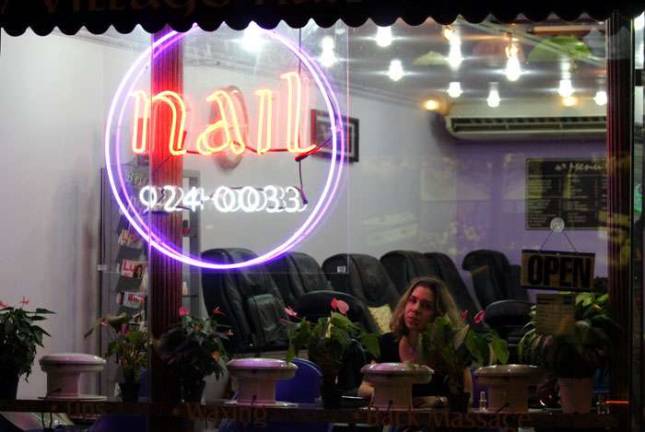Adding guilt to the price of a manicure News

What price beauty?
In the wake of a report in The New York Times, which revealed nail salon workers’ low wages and deplorable conditions, women throughout the city struggled over how to respond to the news, and what that meant for what many had seen as a perk of city living.
“The shocking reality of the situation is incredibly sad,” said Lauren Dulin, who frequents various salons in Manhattan. “While I never thought these women were getting paid a lot of money, the fact that they don’t even make minimum wage, pay to work for free in the beginning of their careers and deal with abusive work environments, all while the government that is supposed to protect them is ignoring the situation, is infuriating.”
The Times interviewed 100 workers, and learned that a majority do not get paid the minimum wage; to make matters worse, some must pay a significant training fee. Owners can also withhold pay until they deem the employee wage worthy.
When asked what they estimated salon workers’ salaries to be, most of the women we spoke to assumed manicurists were making a yearly salary in the range of $30,000. Others thought they were paid by the hour, along the lines of $7 to $10, depending on the caliber of the salon. As the article revealed, some of the salon workers make an hourly wage as low as $1.50.
The women we spoke with all confirmed that the cost of a regular manicure has not increased for what they felt was a very long time. The Times also referred to a 2014 survey in Nails Magazine that said the national average is almost double the average price of $10.50 for a Manhattan manicure. Martha Torres, who grew up in California, noted the difference in wages there, saying, “All employees have to at least earn the minimum wage regardless of tips.” Dulin, a Florida native, was always aware of the fact that this price discrepancy didn’t add up. “I found it strange that the prices in New York City were the same as they were in Florida, given that everything else is more expensive here.”
As far as tipping goes, reading the article did inspire some women to increase what they give. “I definitely tip more now,” Dulin said. Torres agreed, but brought up the possibility that the workers may not even be earning the tip she leaves. “Since reading the article I have increased my tip, but I worry about the employee actually getting it,” she said. “I read that the owners will keep tips or not pay the entire tip and that’s not right. I hope the employee receives the actual tip I leave, but leaving a larger tip makes me feel that maybe I am helping to improve the situation.”
Although Sandy Strk, who goes to salons in both Manhattan and Queens, never saw employees blatantly mistreated, she does notice that they don’t wear protective masks and gloves or take proper lunch breaks. “I see them eating in the back standing up until someone walks in. Then they quickly stop eating and rush to the customer,” she said.
The article stated that in a salon’s hierarchy, the highest value is placed on Korean women, who get paid as much as 15 to 25 percent more than the others. It also conceded that Latinas are made to administer the least desirable jobs, like giving men pedicures. Caitlin Gangi, who also gets her manicures done in both Manhattan and Queens, said, “I have not seen this type of racism in the industry, however I have seen that the new girls do the men.”
The women we interviewed do not feel guilty about the types of services the employees are providing them, including cutting overgrown cuticles and removing calluses from feet. “People pay for lots of services they aren’t good at or dislike doing,” Dulin said. Dana Lyons Haldeman likened it to a doctor’s work, and said that it’s not the undesirable tasks that are to blame, but the wages, which should be commensurate to the labor.
Salon owners interviewed by the Times posed the argument that they were in fact helping immigrants by employing them. Torres, who herself emigrated from Nicaragua, does not share that sentiment. “It makes me sad to see immigrants taking advantage of and abusing other immigrants. We all came here for a better life and they are exploiting others,” she said.
In order to protect against these infractions, the ladies offered suggestions such as implementing a ratings system similar to what is already in effect for restaurants. Another alternative was to enact stricter laws so salons truly do operate as restaurants when it comes to wages and tipping; since the article was published, both the city and the state have vowed to crack down on the industry.
Going forward, Strk would like to see “spot checking from officials” as part of the changes put into place. She also hopes for fair wages, adding, “even if that means the price that I would be paying for a mani/pedi would increase.”